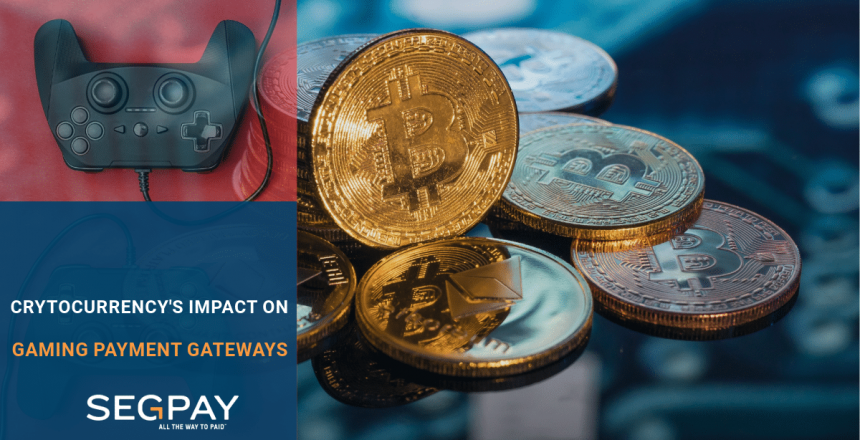- 5 minute read
Ever paused a game and wondered, “Can I use Bitcoin to level up?” That’s not science fiction—it’s the merging worlds of gaming and cryptocurrency. With every passing level and blockchain confirmation, they’re intertwining in ways that could redefine our digital experiences.
As games become more immersive and cryptocurrencies more accepted, destiny is pairing them up for a collaborative future. In 2022, the global valuation of blockchain in gaming reached an impressive $4.83 billion. What’s more, experts predict between 2023 and 2030, the industry will soar to an annual compound growth rate of 68.3%.
However, like any great game plot, there’s a balance of rewards and challenges. On the one hand, we have the promise of seamless, borderless transactions that could revolutionize in-game purchases and player trade. Imagine the thrill of real-time trading with fellow players across the globe without the restraints of traditional banking.
Yet, with new horizons come new hurdles. How will fluctuating cryptocurrency values affect in-game economies? And in a world where cryptocurrency regulations are as varied as game genres, how do developers keep up?
In this blog, we’ll explore the merging of gaming and cryptocurrency. We’ll examine cryptocurrency payment gateways and their significance in the gaming industry. From rapid transactions to global accessibility, you’ll discover this dynamic technology’s benefits and potential challenges. Let’s explore this digital transformation and the future of crypto gaming.
What’s a cryptocurrency payment gateway?
Consumers expect more convenient and diverse payment options in today’s fast-paced digital landscape. The gaming industry is no exception. A cryptocurrency payment gateway is a digital tool that allows businesses to accept digital currencies, such as Bitcoin and Ethereum, as payment for their products or services. Picture it as an evolved cashier, fluent in both traditional and digital currency.
Thanks to cryptocurrency’s global reach, geographical barriers are less problematic for game developers. Seamlessly catering to a worldwide audience is now possible, even in areas where traditional banking options are scarce.
The cryptocurrency payment gateway development isn’t just a new payment method. It’s a fusion of speed, transparency, adaptability, and inclusivity, positioning the gaming industry at the forefront of digital evolution. By embracing this transformative technology, game developers can enhance user experiences and position themselves as innovative leaders.
How does a crypto payment gateway work?
The gaming and financial industries constantly seek innovative technologies to increase customer satisfaction and security. Cryptocurrency payment gateways enable these advantages, benefiting both the customer and the company. Here’s how it works:
- Verification: Once a gamer selects cryptocurrency, the gateway instantly examines the authenticity and cross-checks the wallet balance. This instant verification ensures a layer of trust from the get-go.
- Transaction: The days of prolonged wait times tied to traditional bank transfers are gone, especially for international transactions. The payment gateway for cryptocurrency processes transactions with the speed and precision players have come to expect from the gaming industry.
- Intelligence: With a keen eye on the ever-changing cryptocurrency market, the gateway dynamically chooses between retaining the cryptocurrency or converting it to a more stable fiat currency. It’s a balance of potential and stability.
- Transparency: Each transaction, without exception, is recorded on the blockchain. This permanence guarantees a clear, auditable trail, fortifying trust between gamers and developers.
- Adaptable: Recognizing the fluidity of the gaming industry, the gateway is engineered to seamlessly adapt to new game features or shifts in cryptocurrency trends.
The crypto payment gateway doesn’t just facilitate transactions—it embodies the future of blockchain gaming, merging technology with trust and efficiency with innovation. As the gaming industry surges forward, so does the promise of more seamless, transparent, and empowering financial transactions. With over 3 billion gamers worldwide, we can expect to see more people adopting cryptocurrency as an alternative form of payment.
Impacts: Advantages and Challenges
Cryptocurrencies are reshaping the world of gaming payment gateways. But like every revolution, they come with many benefits and obstacles. Here’s a quick breakdown:
Advantages
- Enhanced privacy and security: Cryptocurrencies ensure transactions remain discreet. With just a wallet address and the blockchain’s decentralized shield and distributed ledger system, data breaches become rare. Each transaction forms a unique block, interlocked with others, creating an unbreakable information chain.
- Global accessibility: No more geographic or banking walls. Cryptocurrency for the gaming industry promises seamless, universal access to games.
- Improved transaction speeds: Say goodbye to transactional snags. With crypto gaming, players can enjoy almost instantaneous purchases.
- Lower transaction fees: Traditional banking’s hefty fees no longer apply, giving gamers and developers a financially favorable environment. With cryptocurrency’s direct nature, transactions flow seamlessly between sender and receiver, cutting through the red tape and slashing unnecessary overhead costs.
Challenges
- Price volatility: Cryptocurrencies are known to be erratic, posing financial unpredictabilities for both gamers and developers. Wild price swings can leave developers in economic uncertainty, and gamers might be disappointed if prices significantly drop after making a big purchase.
- Regulatory uncertainties: The ever-evolving regulatory landscape for cryptocurrencies keeps the gaming industry on its toes, demanding adaptability and foresight. Proper planning and adherence to changing regulatory guidelines will help address this problem.
Understanding these facets empowers the gaming industry to capitalize on the cryptocurrency wave while staying prepared for its challenges. Take a look at this blog to see how the challenges and opportunities of subscription-based gaming compare.
Conclusion
The emerging crypto gaming signals a pivotal transformation in the digital world. Gamers can now execute swift transactions, embracing a newfound fluidity in their digital experiences. Developers, too, find themselves in uncharted territories, capturing markets and audiences previously beyond their grasp.
However, such profound evolution has its challenges. The unpredictable nature of cryptocurrency values combined with evolving global regulatory stances demand attention. Consider these challenges not as setbacks but as drivers—invigorating the industry to innovate and adapt.
Our vantage point offers a clear perspective: this melding of gaming and cryptocurrency isn’t a fleeting trend. It’s an unfolding story promising to redefine the digital world. Integration of cryptocurrencies encourages innovation among payment gateway providers, promoting healthy competition and improved services.
Want to learn more about how cryptocurrency is transforming the gaming industry?
Contact us today, we’d love to chat with you. It’s another way we are here for our merchants All the Way to Paid ™. Reach out to us with your questions at [email protected]




